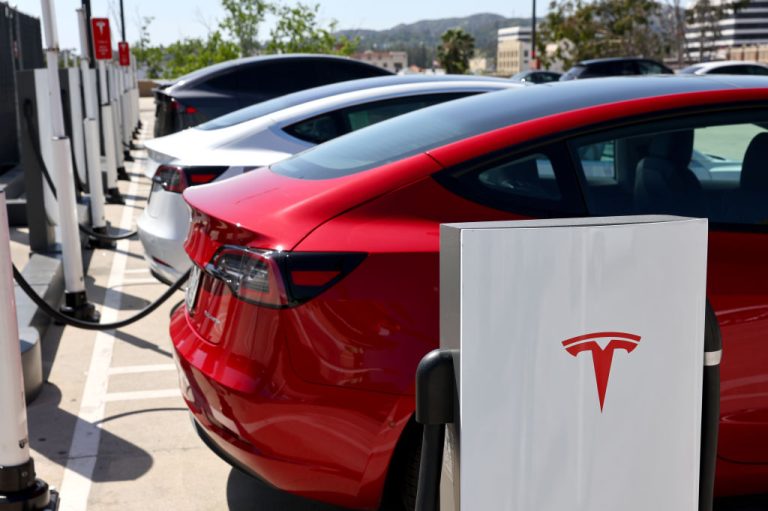Thieves desperate for their next mark have a new target as the deployment of a novel technological trend combines with rising prices in the commodities market: electric car chargers.
The issue made headlines as recently as Jan. 15 when Seattle City Light, Seattle’s electric utility provider, told KOMO News that thefts of electric car charging station equipment they operate have been on the rise.
Media Relations Manager for the utility, Jenn Strang, told KOMO that the problem has been quietly growing since last March.
MORE ON THE ELECTRIC VEHICLE FAD
- By 2035, EV Charging Stations Will Use as Much Power as a Small Town
- ‘Voltswagen’ April Fool’s Gaffe Spotlights Difficulty of EV Paradigm Shift
- Two Women Rented an EV for a 2,000-mile Road Trip, and It Was a Nightmare
- Tesla Needs $100 Billion Worth of Metals to Reach Musk’s 2020 Production Goal
So far, eight charging stations have had their charging cables severed, rendering the stations unusable to local consumers. Strang told the outlet the company believes thieves are stripping the cables for scrap wire.
Copper COMEX futures hit an all-time high of $5.035 per ounce in March of 2022 as virtually all precious metals, oil, natural gas, and wheat, soy, and corn skyrocketed in last year’s inflationary supercycle.
Success
You are now signed up for our newsletter
Success
Check your email to complete sign up
Although copper prices crashed just a few months later back to a low of $3.13 per ounce, prices have since recovered. In the last three months, copper is up 25 percent, peaking at $4.35 an ounce on Jan. 18.
Strang told KOMO that the charging cables are almost all rubber and interior insulation and hold only approximately $10 worth of copper within.
The cost to the utility to replace each one is approximately $2,000 for materials and $500 for installation, she added.
Executive Director for Crime Stopper Puget Sound told KOMO, “What’s a charging cable, anywhere from 6 to 10 to 12 feet, they cut that up in two to six foot lengths, and haul it out quickly, and strip it and go sell it to a fence.”
The trend poses additional concerns for the City, as the utility provider is set to roll out curbside level 2 charging stations in select communities upon residents’ request starting later this year.
The new form of theft isn’t limited to Seattle. In August of 2022, Vice reported on a case where a charging cable was cut and stolen from a charger offered in the parking lot of a hotel in Reno, Nevada.
The outlet interviewed one anonymous worker at the business, who told them that the thieves cut the cable and took it away while it was plugged into someone’s car.
In February of 2022, thieves were bold enough to cut and steal every single charging cable from a Tesla Supercharger station in Oakhurst, California, enthusiast outlet Inside EEVs stated.
Even more extreme cases of electric vehicle-linked thefts have emerged in recent months overseas, as the cost of utilities and commodities often set record highs in 2022.
In December of 2022, Paul Tan, a Malaysia-based automotive blogger, reported on a case where the driver of a BMW X5 plugin hybrid had parked next to a Shell Recharge station and was fueling their vehicle for free.
Tan explained, “Shell Recharge is a paid service – you are supposed to use the ParkEasy app to pay for the barrier on the parking lot to be lowered so you can park at the charger to use it.”
A photograph of the crime scene provided in the article clearly shows the site’s charging cables are long — so that drivers of different configurations and parking abilities may reach their vehicle’s charging ports — while open space in the parkade next to the Recharge station is unblocked and available.
In April, Tan reported on a case where a BYD M3 electric van with a Singapore plate stole power from another Shell Recharge station — this time an outdoor locale — using a similar method.
“Please do not do this, as bad behaviour from EV owners (regardless which country they come from) would deter private companies from investing in our EV charging infrastructure which we need to increase EV adoption in Malaysia,” Tan wrote.
In an even more egregious case, a Tesla driver was detained in Oud-Beijerland, the Netherlands, after devising a way to steal electricity from a roadside streetlamp.
NL Times reported on the case in December of 2022, stating that police posted photos of the bust on social media, stating, “We are curious about the story behind this act.”
The outlet added that while the average Tesla costs €12.60 per 100 kilometers to charge based on electricity prices at the time, under local laws, power thieves faced a maximum penalty of a €100,000 fine (US$108,000 approx.) and 4 years in prison.
Perhaps one reason motivating the Tesla owner to steal electricity was the fact that the 248 horsepower petrol-powered BMW 530i was significantly cheaper to fuel, at only €10.34 per 100 kilometers, based on a €1.88 (US$2.03) per liter (US$7.9 per gallon) fuel cost.







